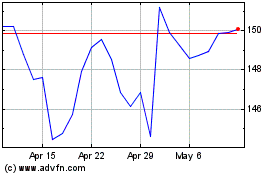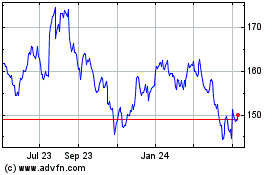Washington, California Sue Johnson & Johnson Over Vaginal Mesh Implants
May 24 2016 - 9:10PM
Dow Jones News
SEATTLE—Washington state and California sued Johnson &
Johnson on Tuesday, saying that for years the company
misrepresented the risks of vaginal mesh implants it sold to repair
pelvic collapse.
In the latest legal actions over the problem-prone devices,
Attorneys General Bob Ferguson of Washington and Kamala Harris of
California accused the New Jersey-based health care giant of
neglecting to tell patients and doctors about the risks and
occurrences of dire, sometimes irreversible complications. Those
include urinary dysfunction, loss of sexual function, constipation
and severe pain.
"For many victims, their health and their quality of life were
forever changed as a result of this deception," Mr. Ferguson told a
news conference. "Sitting upright, lying on their side, walking all
became incredibly painful. ... These women were robbed of their
ability to live and work in the way they once did."
Patients have already filed tens of thousands of lawsuits
against mesh manufacturers, including New Jersey-based Johnson
& Johnson, Massachusetts-based Boston Scientific and
Ireland-based Endo International. In 2014, Endo said it would pay
$830 million to settle more than 20,000 personal injury lawsuits.
Johnson & Johnson faces more than 35,000 lawsuits, Ms. Harris
said.
The plastic mesh is used to treat pelvic organ prolapse, a
condition that involves organs such as the bladder, bowel and
uterus shifting, often after childbirth, a hysterectomy or
menopause. In response to thousands of injuries from the mesh, the
U.S. Food and Drug Administration early this year re-labeled the
products high risk instead of moderate and announced new federal
scrutiny for them. The agency had already concluded that women
getting vaginal mesh have more complications than women who undergo
traditional surgery with stitches.
In an emailed statement, Johnson & Johnson subsidiary
Ethicon Inc., which marketed the mesh, called the lawsuits
unjustified.
"The evidence will show that Ethicon acted appropriately and
responsibly in the marketing of our pelvic mesh products," the
company said. "The use of implantable mesh is often the preferred
option to treat certain female pelvic conditions, including pelvic
organ prolapse and stress urinary incontinence, and is backed by
years of clinical research.
"Ethicon is concerned that the attorneys general's decision to
file its lawsuit will keep women from obtaining treatment for the
often-debilitating symptoms of stress urinary incontinence."
California and Washington led a group of 46 states and the
District of Columbia in investigating the company's practices.
California's lawsuit alleges false advertising and deceptive
marketing. In a news release, Ms. Harris noted that Johnson &
Johnson sold nearly 790,000 of the devices nationwide from 2008 to
2014, including more than 42,000 in California.
Washington's lawsuit alleges tens of thousands of violations of
the state's consumer protection law and seeks penalties that could
reach well into the millions of dollars. Mr. Ferguson said Johnson
& Johnson sold 12,000 of the devices in Washington but never
told patients the mesh can cause chronic inflammation as their body
rejects the foreign material; that the mesh harbors infections that
can live indefinitely in its small weave; or that the mesh
frequently protrudes into an organ or through the vaginal wall, in
a condition called "erosion."
Copyright 2016 The Associated Press.
(END) Dow Jones Newswires
May 24, 2016 20:55 ET (00:55 GMT)
Johnson and Johnson (NYSE:JNJ)
Historical Stock Chart
From Mar 2024 to Apr 2024

Johnson and Johnson (NYSE:JNJ)
Historical Stock Chart
From Apr 2023 to Apr 2024
